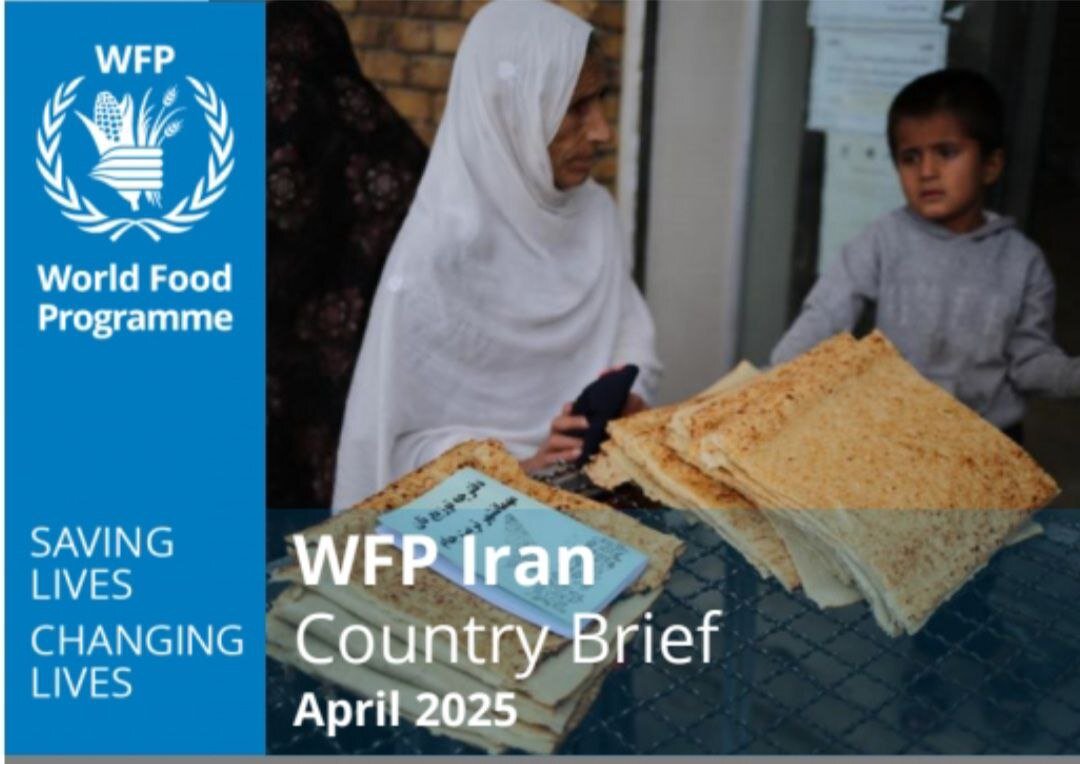WFP releases April report on Iran

TEHRAN – The World Food Program (WFP) has released a report, expounding on activities in Iran over the month of April.
In April, WFP food assistance reached 32,233 beneficiaries, which included Afghan and Iraqi refugees as well as Iranian teachers. Refugees are assisted with a staple food basket which includes fortified wheat flour (12 kg per person per month) and vegetable oil (810 ml per person per month).
Under cash-based transfers, following the revision of WFP’s Minimum Expenditure Basket (MEB) conducted in November 2024, the Centre for Aliens and Foreign Immigrants Affairs (CAFIA) confirmed adjustments to cash transfer values starting in January.
In April, WFP continued to provide the increased cash transfers to better support essential living costs. The amount doubled from IRR 2.5 million (US$ 3.6) to IRR 5 million (US$ 7.3) for men-headed households and from IRR 3 million (US$ 4.4) to IRR 6 million (US$ 8.7) for women-headed households.
WFP provided 2,606 refugee girls with a monthly cash incentive of IRR 2 million (US$ 2.9) transferred to their bank accounts. This is a part of WFP Iran’s efforts to promote education for refugee girls by providing them with cash for each month of regular school attendance.
By April, WFP Iran helped ease the financial burden associated with the gluten-free dietary needs of 52 refugee celiac patients from WFP’s beneficiaries by providing them with an extra cash amount of 9.7 million rials (US$ 14.19) per person as a replacement for their usual food entitlement.
WFP’s school feeding program, reached 9,239 refugee students and their teachers, in April, with daily snacks consisting of milk, date bars and/or fortified biscuits.
WFP supported 378 refugees with disabilities in April across nine settlements, each receiving an additional monthly cash support of IRR 3 million (US$ 4.3), on top of their regular aid. In April, assistance covered Kerman, Lorestan, West Azerbaijan, Fars, Khuzestan, Markazi, Khorasan Razavi, and Semnan provinces after initially being introduced to two refugee settlements across two provinces.
To enhance the economic resilience and self-sufficiency of 364 refugees (50 percent women) in April, WFP continued its support for 24 income-generating initiatives across 18 settlements. Activities included welding, tailoring, baking, and farming, among others.
WFP provided 35 home-based bakery ovens to the Jahrom settlement to support household-level bread production, in response to a request from CAFIA. This intervention was initiated due to the absence of a bakery within the settlement, which limited beneficiaries’ access to bread. As beneficiaries rely on the wheat flour distributed by WFP, access to ovens was essential to help meet their basic food needs.
In 2024, WFP provided a combination of in-kind and cash assistance to address the food needs of over 33,000 vulnerable refugees in Iran. As a result, 70 percent of them were able to consume food at an acceptable level, a figure that remains nearly stable compared to the previous year.
Since August, WFP successfully increased the value of the cash transfer entitlement by 25 percent, actively helping to mitigate the immediate economic challenges reported by refugees.
WFP has maintained a presence in Iran since 1987, primarily focused on addressing the food security needs of refugees mainly from Afghanistan. Iran has hosted refugees for over four decades. Most refugees, along with those in refugee-like conditions, reside in urban, peri-urban, and rural areas, often integrated with host communities. However, the most vulnerable refugees living in 20 settlements across 13 provinces, face a precarious food security situation that necessitates continued humanitarian assistance by WFP.
WFP provided food assistance, educational support, and livelihood opportunities through in-kind food distributions, unconditional cash transfers, and capacity-strengthening initiatives to eligible refugees who live in settlements.
Given the economic situation in Iran in recent years, Afghan refugees have also faced many challenges, including reduced income opportunities and diminished purchasing power, which have impacted their food security and well-being, particularly among those in settlements. In response, WFP adjusted its Interim Country Strategic Plan (ICSP 2023-2027) to align with the need by modifying cash entitlements and food rations, adjusting the number of beneficiaries, and extending the duration of the ICSP by two years to align with the United Nations Sustainable Development Framework (UNSDF 2023-2027), ensuring uninterrupted assistance.
WFP implemented activities under the ICSP to sustain its support to these refugees and address their increasing humanitarian needs. There are around 35,000 most vulnerable documented refugees who live in 20 settlements across 13 provinces in Iran and are benefitting from WFP-provided food assistance.
MT/MG
